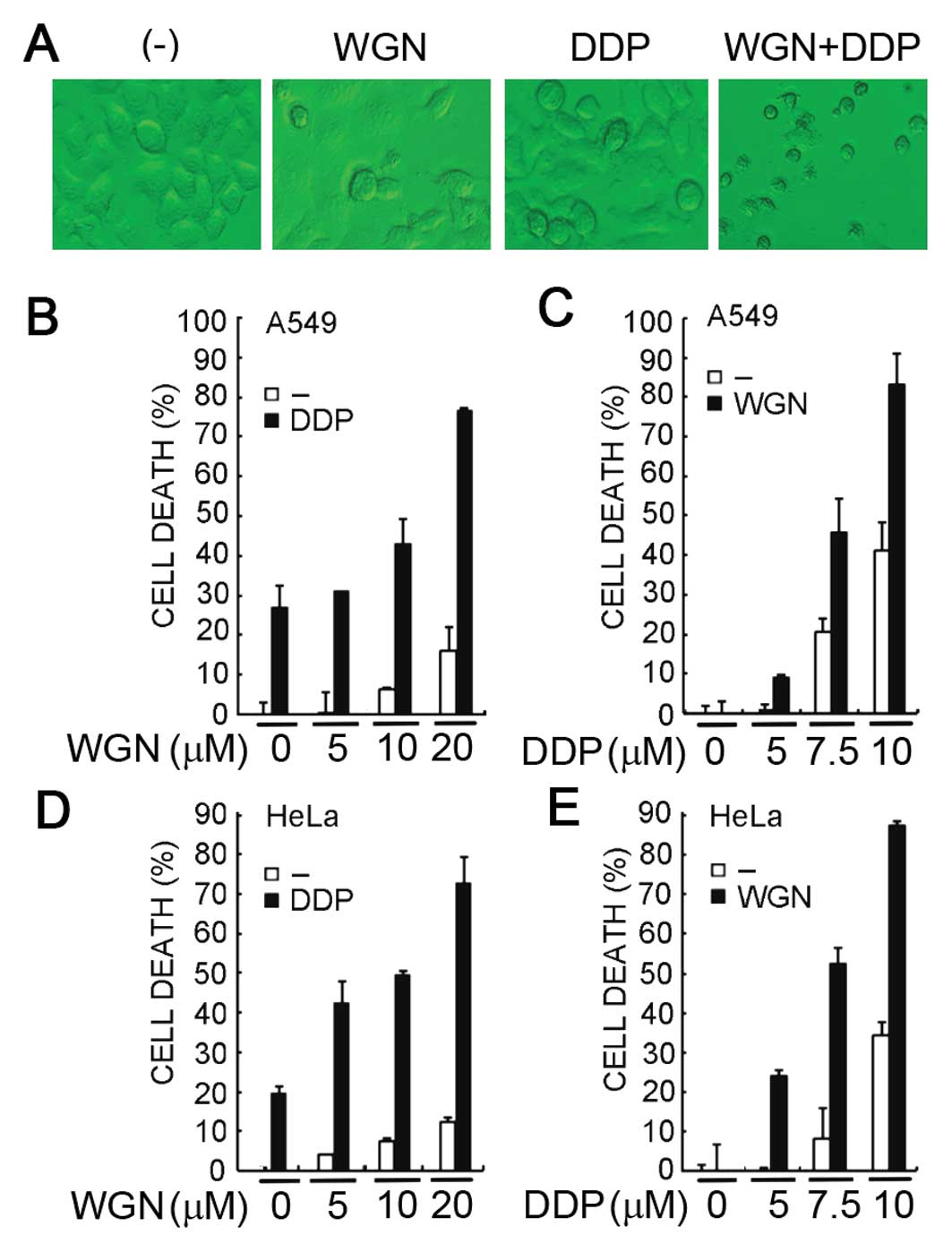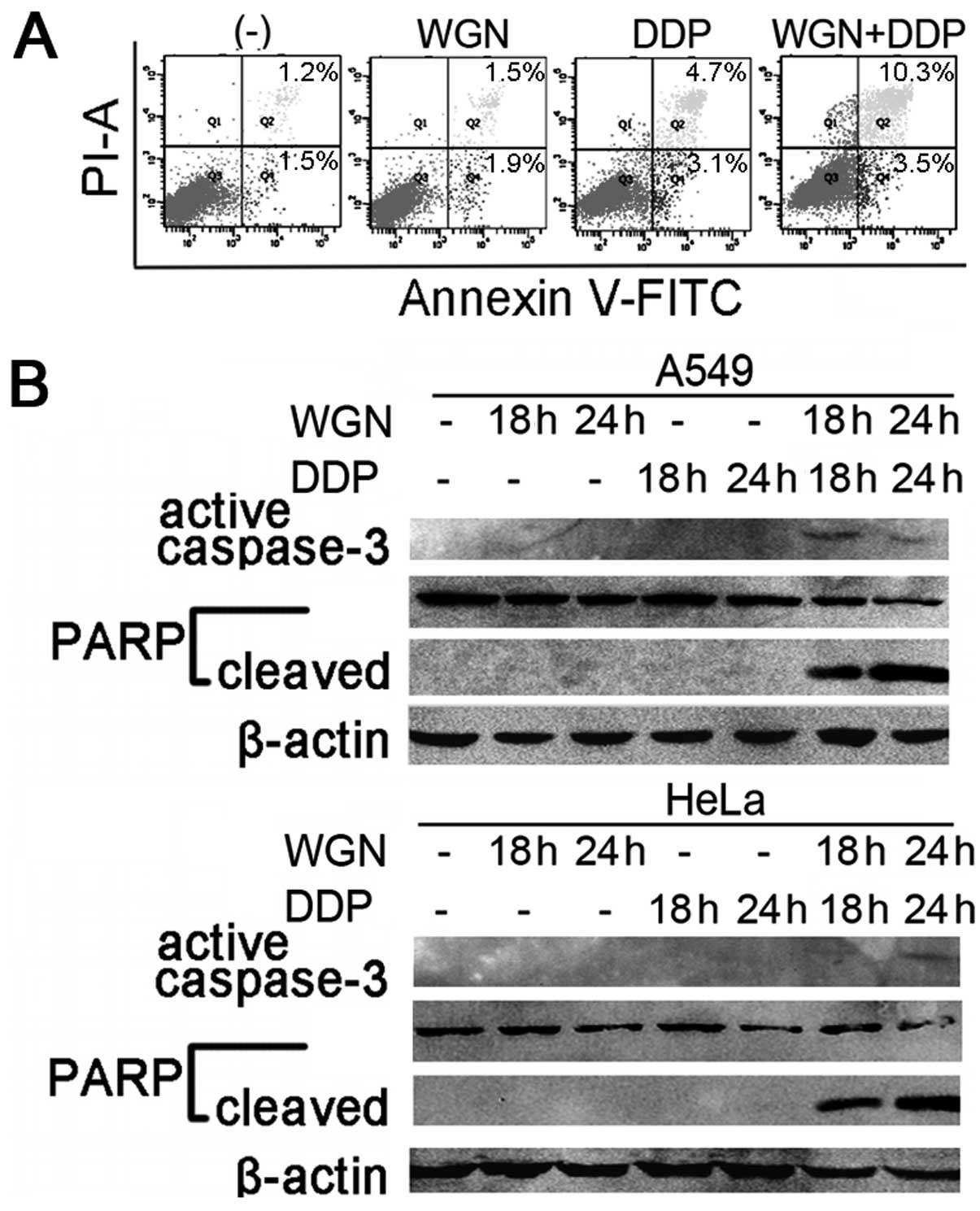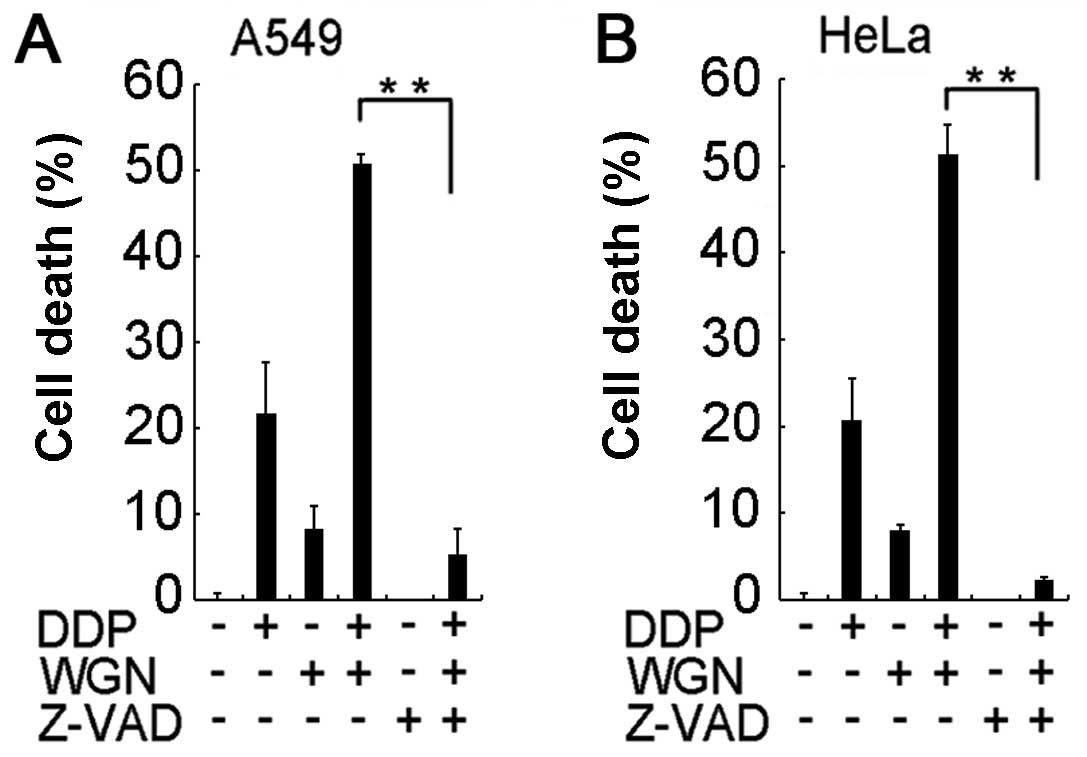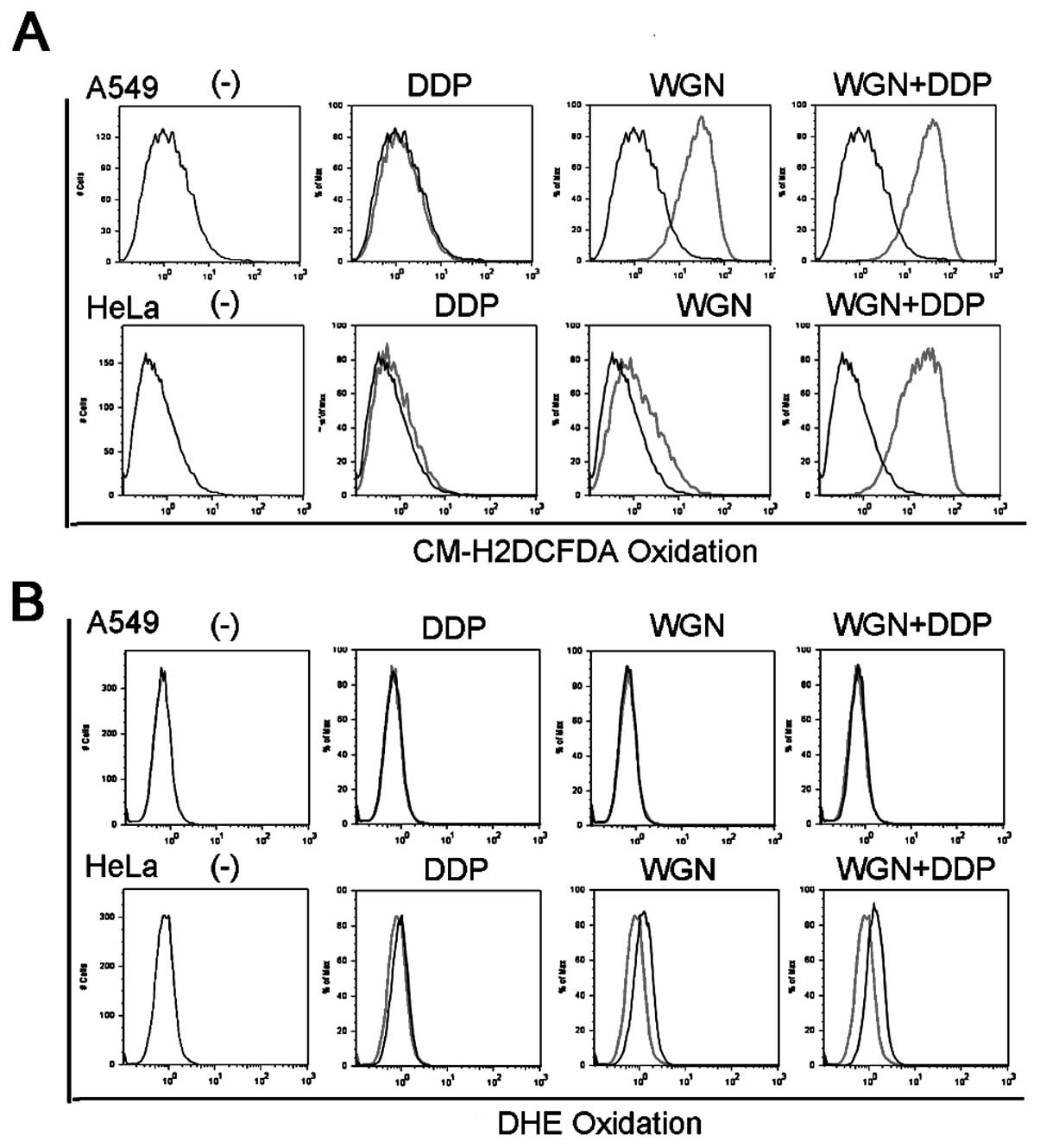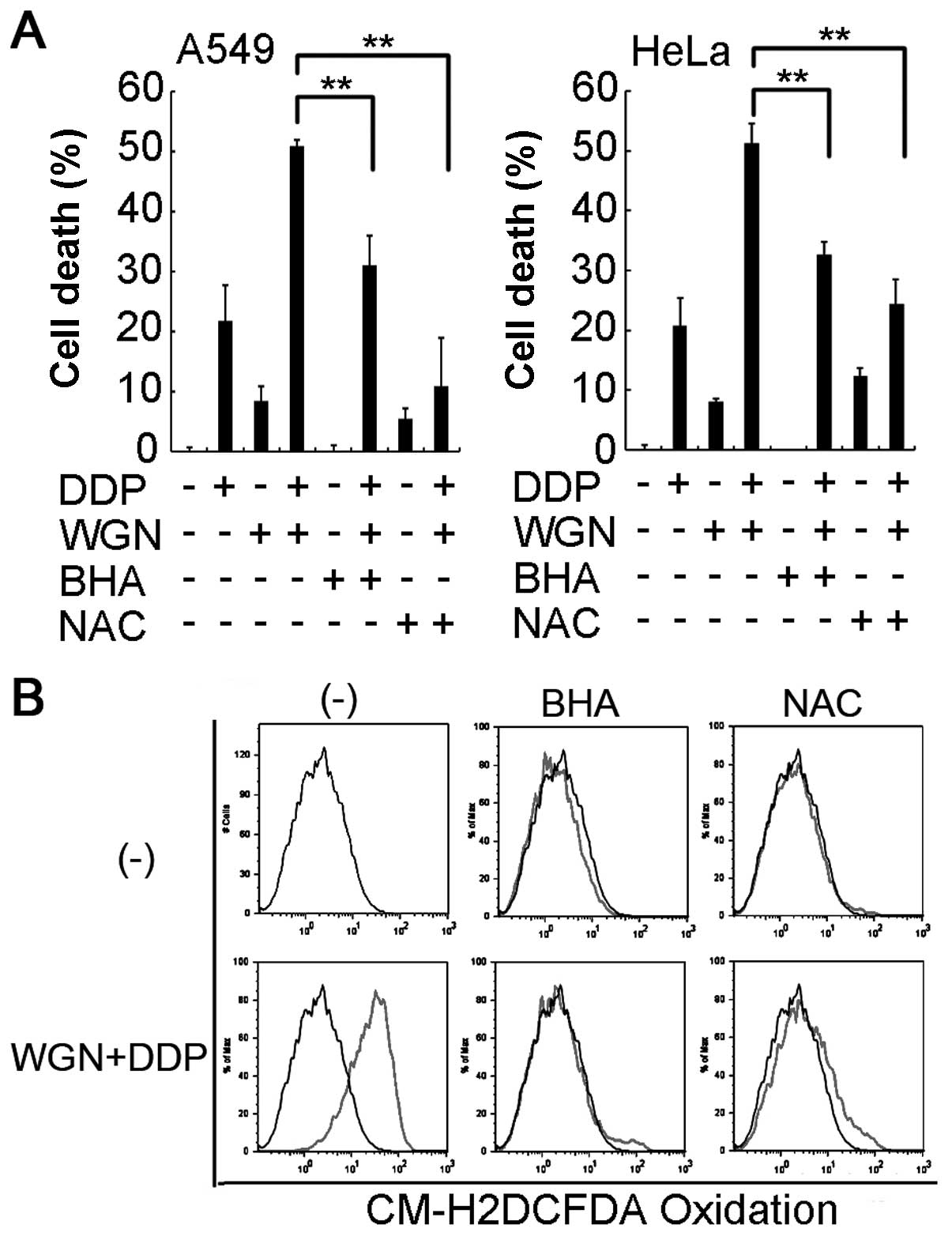|
1
|
Cohen SM and Lippard SJ: Cisplatin: from
DNA damage to cancer chemotherapy. Prog Nucleic Acid Res Mol Biol.
67:93–130. 2001. View Article : Google Scholar : PubMed/NCBI
|
|
2
|
Siddik ZH: Cisplatin: mode of cytotoxic
action and molecular basis of resistance. Oncogene. 22:7265–7279.
2003. View Article : Google Scholar : PubMed/NCBI
|
|
3
|
Niedner H, Christen R, Lin X, Kondo A and
Howell SB: Identification of genes that mediate sensitivity to
cisplatin. Mol Pharmacol. 60:1153–1160. 2001.PubMed/NCBI
|
|
4
|
Chi YS, Lim H, Park H and Kim HP: Effects
of wogonin, a plant flavone from Scutellaria radix, on skin
inflammation: in vivo regulation of inflammation-associated
gene expression. Biochem Pharmacol. 66:1271–1278. 2003.PubMed/NCBI
|
|
5
|
Zhao Y, Li H, Gao Z, Gong Y and Xu H:
Effects of flavonoids extracted from Scutellaria baicalensis
Georgi on hemin-nitrite-H2O2 induced liver
injury. Eur J Pharmacol. 536:192–199. 2006.PubMed/NCBI
|
|
6
|
Ma SC, Du J, But PP, Deng XL, Zhang YW,
Ooi VE, Xu HX, Lee SH and Lee SF: Antiviral chinese medicinal herbs
against respiratory syncytial virus. J Ethnopharmacol. 79:205–211.
2002. View Article : Google Scholar : PubMed/NCBI
|
|
7
|
Lee DH, Kim C, Zhang L and Lee YJ: Role of
p53, PUMA, and Bax in wogonin-induced apoptosis in human cancer
cells. Biochem Pharmacol. 75:2020–2033. 2008. View Article : Google Scholar : PubMed/NCBI
|
|
8
|
Baumann S, Fas SC, Giaisi M, Muller WW,
Merling A, Gulow K, Edler L, Krammer PH and Li-Weber M: Wogonin
preferentially kills malignant lymphocytes and suppresses T-cell
tumor growth by inducing PLCγ1- and Ca2+-dependent
apoptosis. Blood. 111:2354–2363. 2008.PubMed/NCBI
|
|
9
|
Enomoto R, Koshiba C, Suzuki C and Lee E:
Wogonin potentiates the antitumor action of etoposide and
ameliorates its adverse effects. Cancer Chemother Pharmacol.
67:1063–1072. 2011. View Article : Google Scholar : PubMed/NCBI
|
|
10
|
Lee E, Enomoto R, Koshiba C and Hirano H:
Inhibition of P-glycoprotein by wogonin is involved with the
potentiation of etoposide-induced apoptosis in cancer cells. Ann NY
Acad Sci. 1171:132–136. 2009. View Article : Google Scholar : PubMed/NCBI
|
|
11
|
Wang HW, Lin CP, Chiu JH, Chow KC, Kuo KT,
Lin CS and Wang LS: Reversal of inflammation-associated dihydrodiol
dehydrogenases (AKR1C1 and AKR1C2) overexpression and drug
resistance in non-small cell lung cancer cells by wogonin and
chrysin. Int J Cancer. 120:2019–2027. 2007. View Article : Google Scholar
|
|
12
|
Lee DH, Rhee JG and Lee YJ: Reactive
oxygen species up-regulate p53 and Puma; a possible mechanism for
apoptosis during combined treatment with TRAIL and wogonin. Br J
Pharmacol. 157:1189–1202. 2009. View Article : Google Scholar
|
|
13
|
Yang L, Zheng XL, Sun H, Zhong YJ, Wang Q,
He HN, Shi XW, Zhou B, Li JK, Lin Y, et al: Catalase
suppression-mediated H(2)O(2) accumulation in cancer cells by
wogonin effectively blocks tumor necrosis factor-induced NF-κB
activation and sensitizes apoptosis. Cancer Sci. 102:870–876
|
|
14
|
Wang X, Ju W, Renouard J, Aden J, Belinsky
SA and Lin Y: 17-Allylamino-17-demethoxygeldanamycin
synergistically potentiates tumor necrosis factor-induced lung
cancer cell death by blocking the nuclear factor-κB pathway. Cancer
Res. 66:1089–1095. 2006.PubMed/NCBI
|
|
15
|
Ju W, Wang X, Shi H, Chen W, Belinsky SA
and Lin Y: A critical role of luteolin-induced reactive oxygen
species in blockage of tumor necrosis factor-activated nuclear
factor-κB pathway and sensitization of apoptosis in lung cancer
cells. Mol Pharmacol. 71:1381–1388. 2007.PubMed/NCBI
|
|
16
|
Fas SC, Baumann S, Zhu JY, Giaisi M,
Treiber MK, Mahlknecht U, Krammer PH and Li-Weber M: Wogonin
sensitizes resistant malignant cells to TNFα- and TRAIL-induced
apoptosis. Blood. 108:3700–3706. 2006.PubMed/NCBI
|
|
17
|
Galati G and O’Brien PJ: Potential
toxicity of flavonoids and other dietary phenolics: significance
for their chemopreventive and anticancer properties. Free Radic
Biol Med. 37:287–303. 2004. View Article : Google Scholar
|
|
18
|
Lin Y, Shi R, Wang X and Shen HM:
Luteolin, a flavonoid with potential for cancer prevention and
therapy. Curr Cancer Drug Targets. 8:634–646. 2008. View Article : Google Scholar : PubMed/NCBI
|
|
19
|
Cao G, Sofic E and Prior RL: Antioxidant
and prooxidant behavior of flavonoids: structure-activity
relationships. Free Radic Biol Med. 22:749–760. 1997. View Article : Google Scholar : PubMed/NCBI
|
|
20
|
Sugihara N, Arakawa T, Ohnishi M and
Furuno K: Anti- and pro-oxidative effects of flavonoids on
metal-induced lipid hydroperoxide-dependent lipid peroxidation in
cultured hepatocytes loaded with α-linolenic acid. Free Radic Biol
Med. 27:1313–1323. 1999.PubMed/NCBI
|
|
21
|
Gordaliza M, Garcia PA, del Corral JM,
Castro MA and Gomez-Zurita MA: Podophyllotoxin: distribution,
sources, applications and new cytotoxic derivatives. Toxicon.
44:441–459. 2004.PubMed/NCBI
|
|
22
|
Hildeman DA, Mitchell T, Aronow B,
Wojciechowski S, Kappler J and Marrack P: Control of Bcl-2
expression by reactive oxygen species. Proc Natl Acad Sci USA.
100:15035–15040. 2003. View Article : Google Scholar : PubMed/NCBI
|
|
23
|
Wang L, Chanvorachote P, Toledo D, Stehlik
C, Mercer RR, Castranova V and Rojanasakul Y: Peroxide is a key
mediator of Bcl-2 down-regulation and apoptosis induction by
cisplatin in human lung cancer cells. Mol Pharmacol. 73:119–127.
2008. View Article : Google Scholar : PubMed/NCBI
|
|
24
|
Tenopoulou M, Doulias PT, Barbouti A,
Brunk U and Galaris D: Role of compartmentalized redox-active iron
in hydrogen peroxide-induced DNA damage and apoptosis. Biochem J.
387:703–710. 2005. View Article : Google Scholar : PubMed/NCBI
|















